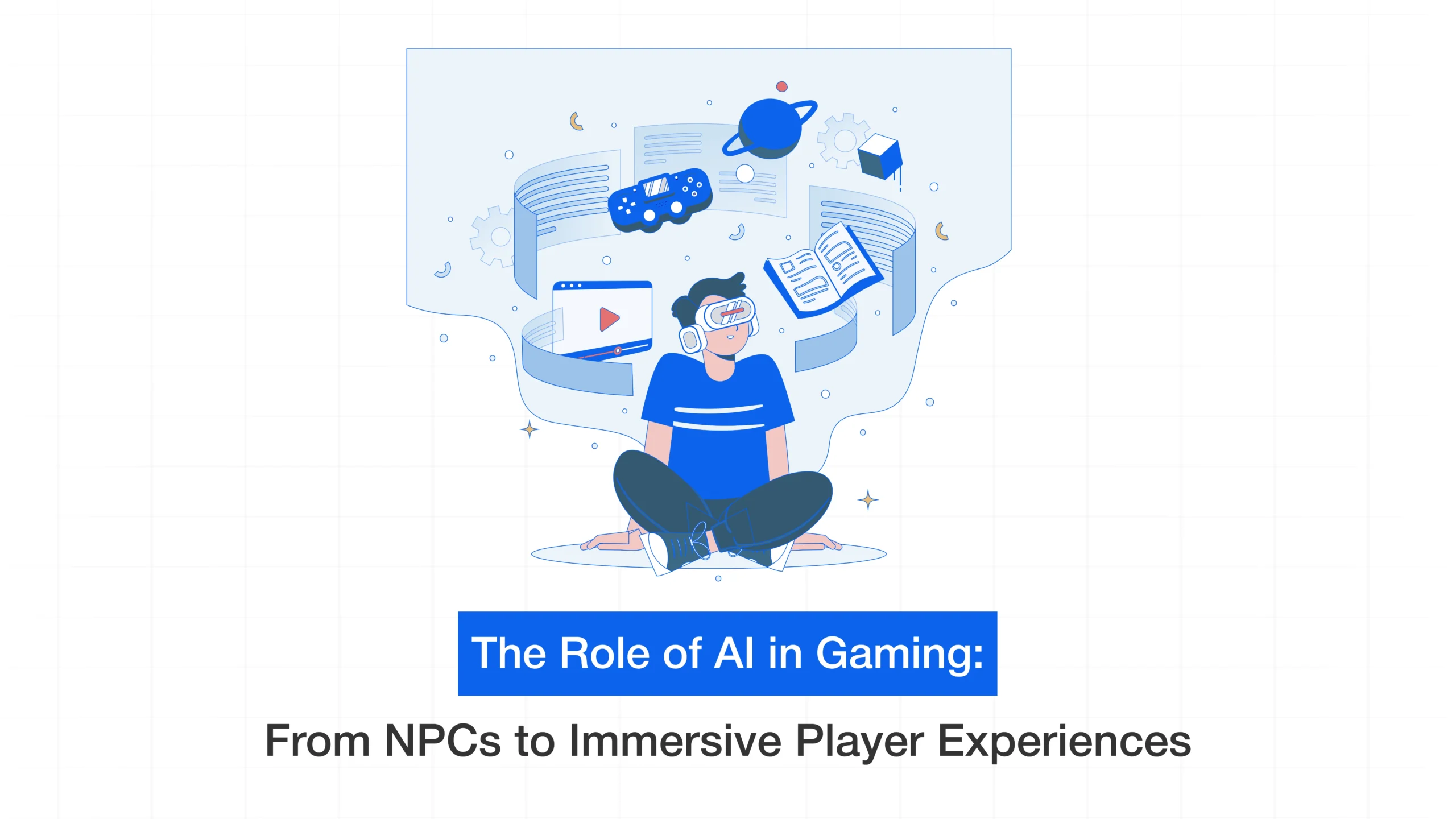
AI in Gaming: From NPCs to Immersive Player Experiences
- September 6, 2025
- Ayesha J
- 10:00 am
Artificial intelligence in video games has evolved from simple script command to a dynamic system that optimizes and surprises players. Today, AI in gaming is no longer about the enemies that are moving forward – it is about preparing the entire ecosystems for reliable characters, the environment, and interactive stories. With the AI game development, developers design titles coloring the line between human creativity and machine intelligence, which provides a far darker and more immersive gaming experience than ever.
The Evolution of AI in Gaming
AI in gaming has influenced how players engage with virtual environments for many years. Attack, defend, and retreat were the strict routines that early AI NPCs (non-playable characters) followed. However, a paradigm shift occurs in 2025. In order to create adaptive characters who react differently with each playtime, developers use AI game development techniques such as machine learning and neural networks.
Games are no longer static as a result of this progression. They are dynamic and constantly pick up new skills from player activities. The future of AI in gaming, where customization and unpredictability are paramount, has been reshaped by such innovation.
AI NPCs: From Background Figures to True Companions
In earlier titles, AI NPCs were mere background fillers. Today, they’re designed as companions, rivals, or guides that learn from a player’s behavior. Imagine an ally who adapts to your combat style or an enemy who remembers your last tactic.
Developers now leverage AI in gaming to script less and simulate more. The outcome? Emergent behaviors, realistic speech trees, and emotionally complex characters. This change guarantees that each gameplay session feels distinct while also improving storytelling.
Building an Immersive Gaming Experience with AI
It takes more than just amazing visuals to create a fully immersive gaming experience. It requires realistic-feeling settings and characters. Realistic crowd dynamics, shifting weather patterns, and adaptable in-game economics are all made possible by artificial intelligence in video games.
AI systems can, for instance, model ecosystems in which animals adjust to the presence of players or settings that change in response to decisions made by the community as a whole. Studios may create environments that mimic the unpredictable nature of the actual world using AI game creation, increasing immersion to previously unheard-of levels.
The Future of AI in Gaming: Where Are We Headed?
AI in gaming has a bright future at the nexus of computer power and creativity. In order to customize environments, quests, and even music to user preferences, developers are experimenting with generative AI. This ensures that no two players experience the same game in precisely the same way, enhancing rather than replacing human imagination.
The distinction between actual and virtual life will become hazier as AI game development integrates virtual reality (VR) and augmented reality (AR). Adaptive storylines, hyper-realistic simulations, and personalized NPCs are just the start.
Why Is AI Game Development a Game-Changer?
The strength of AI in gaming is in its capacity to augment human storytelling rather than overshadow it. Studios can reduce repetitive design tasks and concentrate on artistic direction and narrative depth by utilizing strong AI content creation tools for games.
The rewards are enormous for players: incredibly captivating plots, lifelike landscapes, and incredibly realistic AI NPCs. In a cutthroat market, it stands for efficiency, scalability, and innovation for developers.
The integration of AI in gaming is not about machines replacing creators—it’s about machines empowering creators to design the impossible. From smarter AI NPCs to environments that feel breathtakingly real, the future of AI in gaming is set to redefine how we play, experience, and even think about games.
Looking to transform your gaming project with cutting-edge AI game development? Partner with Kirshi Technologies—where creativity meets intelligence to deliver unforgettable immersive gaming experiences.
Latest Blogs
Why Businesses That Invest in the Right Technology Grow Faster
How Smart Businesses Turn Digital Chaos into Scalable Growth
Why the Best Digital Solutions Begin With Better Questions
Schedule your free consultation and get expert guidance
FAQ
AI is used to operate AI NPCs, adapt games based on players’ features, create a dynamic environment, and provide a consuming gaming experience that develops in real time.
The benefits include adaptive characters, individual stories, lack of time, and new features that define the future of AI in games.
No. AI game development enhances human creativity but doesn’t replace it. Developers provide vision and emotion, while AI brings efficiency, unpredictability, and adaptability.